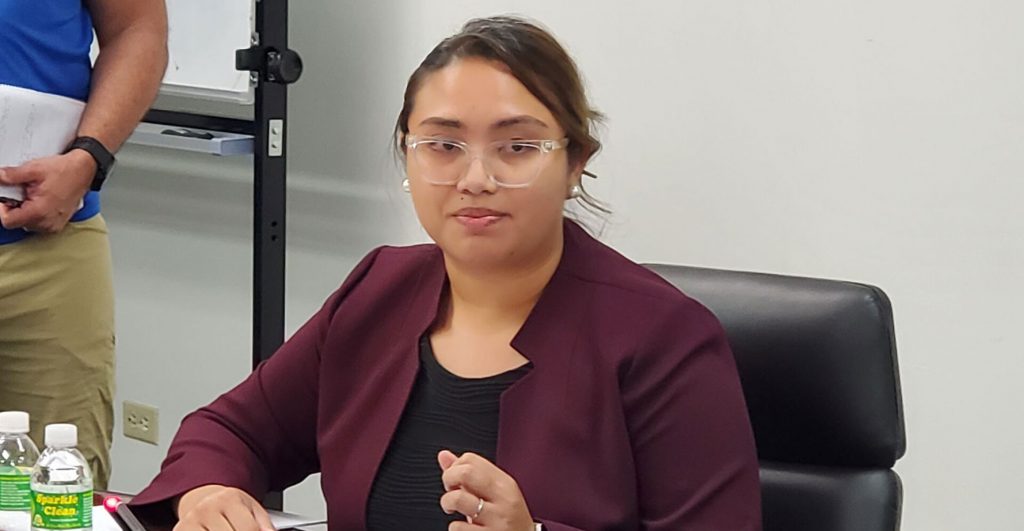$25M seed money sought to get $289M worth of projects going
Some $289 million worth of Capital Infrastructure Project funds are in the pipeline and the CNMI government is planning to look for and set aside at least $25 million that can be tapped to get the projects going, while the government is still working on drawing down the funds.
That’s the plan right now, according to Finance Secretary Tracy B. Norita, during the Senate Fiscal Affairs Committee’s hearing on the government’s fiscal year 2024 budget Friday, adding that the CIP financing is being eyed as one of the administration’s plans to generate revenue.
With the $25 million “seed money,” Norita said this will be some sort of a revolving fund, and the construction contractors and all the businesses that are helping in those projects will start to generate revenue and pay taxes.
She said they envision that this seed money would help get these vendors paid immediately or on time, while the Executive Branch processes these drawdowns and then immediately replenish the seed money account.
“This is just one way that we can jumpstart these projects to get moving,” she said.
The major CIP projects that are in the pipeline are funded by the Economic Development Administration, $108 million; Community Development Block Grant-Mitigation, $16 million; Federal Emergency Management Agency, $70 million; Broadband Equity, Access, and Deployment, $81 million; and Capital Projects Fund, $14 million.
Under the $107.6-million EDA projects, she said the Northern Marianas College is about to break ground on the NMC Student Center. Work has already been done and the designs for their CREES facility and NMC Workforce Training Center are now ready.
Norita said the Oleai Sports Complex is seeing progress with their design, while the Department of Finance Economic Resiliency Center’s design is moving up to 60%.
“We also see the Garapan Revitalization Project. So again, these are just many of the projects that are in progress,” she said, adding that this is one of the factors why the Business Gross Revenue could increase if they facilitate these projects and get them moving.
Sen. Paul A. Manglona (Ind-Rota) described the proposed “seed money” as a brilliant idea as that there’s a lot of private companies that are still owed by the government, but also expressed concern that it may be depleted at once. “Who knows, if we start with this revolving fund, maybe it be depleted in a month,” the senator said.
Norita agreed that it is a great idea to jumpstart the projects, but stated that the seed money is not going to be intended to replace the projects’ original funding.
“It is intended to facilitate and expedite the payment to the contractors so they can pay based on the revenues that they actually generate and then…it puts the work on the Executive Branch to ensure that we get the drawdowns in,” she said.
Usually the drawdown should take no more than two weeks, Norita said, and so the idea for the seed money account is that it will be replenished quickly in just two weeks.
When asked how much the government owes vendors, Norita said she does not have the exact numbers today because, in the case of large road projects, the invoices don’t get entered to be paid unless that it gets all the required signatures and signs-offs, and before they can even submit to the grantors for a drawdown.
“So that whole process takes time while the contractor already basically submitted their invoice,” she said.
For large CIP projects, that process of approving the invoice takes a longer time.
At a recent House of Representatives session, Ways and Means Committee chair Rep. Ralph N. Yumul (Ind-Saipan) urged House members to explore, with the approval of the administration and Marianas Public Land Trust, setting aside seed money so that interest earned on those investment under MPLT can be designated to address the medical referral system permanently.
At the same session, Rep. Blas Jonathan T. Attao (Ind-Saipan) disclosed that one of the plans that’s being laid out by the administration right now is to leverage a line of credit, whether it be from other institutions outside of the CNMI, bonds or others.
Attao said MPLT is definitely one of the entities that they’re looking at, not just to borrow money but actually to have a line of credit.
He said a lot of these CIP projects won’t move forward without money upfront for the payment of these vendors for a drawdown.
























